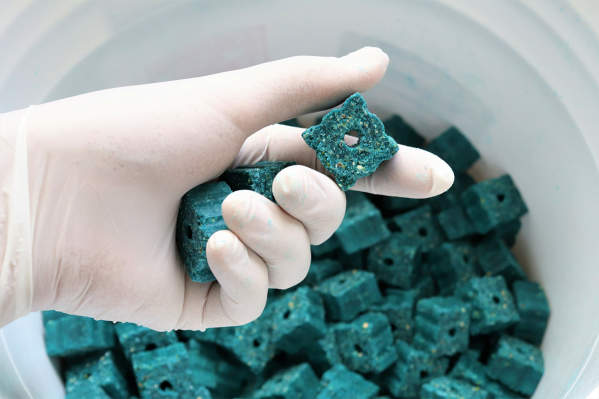Unfortunately, sometimes our dogs accidentally get their paws on things that were not intended for their consumption. In some scenarios, dogs can eat these items and are relatively unscathed, but in others, their consumption can be very dangerous.
If your dog ate rat poison or rodenticide, it’s essential that you act quickly. This could be an extremely dangerous situation for your dog, and there are several things that you should keep in mind.
First, it’s important that you try your best to refrain from panicking. While this is certainly an anxiety-inducing situation, your pet will be able to pick up on your emotions. If you react in a panicked and upset manner, your dog might match your emotions. Instead, try to remain calm and direct your attention to what you can do to give your dog the best chance of making a full recovery.
The reality is that accidents happen, and while it’s stressful and upsetting when they do, you should keep in mind that if you get your dog to a veterinarian as soon as possible, your pet could recover from this situation. Do not hesitate to get help right away. In a situation where your dog ate rat poison, it’s essential that you act as quickly as you can.
How does rat poison affect dogs?
Rat poison can harm dogs in several ways. This is why it's essential that you are mindful about where you stock your rat poison. Always keep it away from a dog that is looking for a “snack.” In addition, there are alternatives to rat poison like traps and sticky sheets.
Here’s what diligent pet parents need to know about how rat poison can impact their dogs.
Anticoagulant rodenticides
There are chemicals in rodenticides that are designed to kill animals, which is why it could be extremely toxic for your dog to consume these. The main chemical that causes this is called an anticoagulant.
These chemicals essentially lead to uncontrolled bleeding because they impact the rodent’s ability to form a blood clot. Canines’ symptoms aren’t always visible right away. Noticeable signs can appear up to five days after the initial exposure. Unfortunately, if the symptoms are untreated, this could lead to death.
Vitamin D3
Vitamin D3 is another way that rodenticides work to effectively kill off rats. Because this leads to dangerously high levels of calcium and phosphorus in the body, the result could be severe, acute kidney failure.
Such exposure might have long-term repercussions, and the evidence of poisoning could be delayed one to two days. This delay in symptoms can be extremely hazardous, as the poison has already had the opportunity to impact your pet’s body.
Bromethalin
Another ingredient that is used in rat poison is called bromethalin. This was created in 1985 and is not an anticoagulant. However, it's extremely potent and could kill a rodent in a single feeding.
You should keep this away from your dog because it could be extremely hazardous. If your dog gets their paws on a rat poison that contains this, there can be devastating consequences, including brain swelling.
Zinc and aluminum phosphides
Lastly, aluminum and zinc phosphides are rodenticides that are often used to protect grain when it's in stores and also during the transpiration process.
Poisoning could occur due to direct ingestion or also accidental inhalation. This could potentially lead to circulatory problems.
How can I tell if my dog ate rat poison?
First, it’s important to remember that it’s not only possible for your dog to get sick from eating rat poison itself but also from consuming a rat that had the poison in its body. Therefore, if your dog is in your yard and comes across a dead rat that was poisoned and attempts to eat it, there could be devastating consequences.
There are dangers associated with consuming rat feces as well since their feces can be the source of an infectious disease like Hantavirus.
Some ingredients in rat poison do not manifest symptoms quickly, so it can be days before you realize that your dog ate rat poison. This is why it's essential that if you have even a slight suspicion that your pet ate this toxin, you get them to your veterinarian as soon as you can.
There are some symptoms that you can monitor your dog for, but again, in a situation like this, it’s better to act quickly than wait for symptoms to appear.
There are several signs that your dog has ingested rat poison. These include:
Tremors
Neurological changes
Weakness
Lethargy
Decrease in appetite
Increased thirst
Increased need to urinate
What should I do if my dog eats rat poison?
In addition to remaining calm, it's important to get your dog help as soon as possible.
Contact an emergency veterinarian ASAP
If your dog ate rat poison, you need to contact an emergency veterinarian to get medical treatment for your pet right away. The necessity of smooth, quick action cannot be understated in such a circumstance.
The only way that your dog will be able to survive this is by getting them to the vet quickly. The veterinarian will be able to create a course of treatment to give your dog the best odds of making a complete recovery.
In addition, when you are contacting your veterinarian, you should have an understanding of how much of the poison that your dog ate (if possible), the timeline of when your dog ate the rat poison, and the brand/type. Knowing the brand/type, and also when it was made, will be helpful in figuring out what it contains. If you have the package that contained the poison, take it with you.
What will the vet do?
The course of action that your vet will take to treat your dog after ingesting rat poison depends on several factors, so treatment will vary on a case-by-case basis. However, if your dog is being treated for rat poison consumption, here are some potential treatment plans that you can expect.
While treating a dog for rat poison consumption is considered to be one of the most difficult hospitalizations, a trusted veterinarian could be able to help your pet if you bring them in a timely manner.
They may induce vomiting
One thing that the vet might attempt to do is induce vomiting. This will be especially relevant if the compound that they consumed is considered to be highly toxic. This will be aimed at trying to reduce the amount of toxin that is in your pet’s body.
They may administer activated charcoal
Activated charcoal is another tactic that a veterinarian might try to help a dog that ingested rat poison. This works to help prevent the absorption of bromethalin, which is contained in some rat poisons.
They may admit your dog to the hospital
Lastly, your pet may be admitted to the hospital. Because this can take dogs a while to recover from, your pet will likely be in the care of veterinary professionals for a while to ensure that they are able to make a successful recovery.
This is the best place for a dog that ingested rat poisoning to be, as it provides them a place to be monitored to ensure that they are able to heal.
What are pet-friendly alternatives to rat poison?
Instead of using toxic poisons, you could use rat traps and sticky sheets. Just be sure that these do not also contain poison that could be harmful to your pet.
You can also check the safety of the product before you buy it by ensuring that it is child and pet safe; it should be indicated right on the label.
Safe pest control protects pets
Experiencing a situation where your dog ate rat poison is nerve-wracking, but our Pawp Professionals are available to help answer whatever questions you have 24/7.
You will never need to schedule an appointment or wait to speak to a veterinarian or veterinary nurse. With telehealth visits available, you can get your medical questions about your pet answered whenever, wherever.

Reviewed and fact-checked by
Mika, RVT at Pawp
